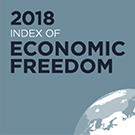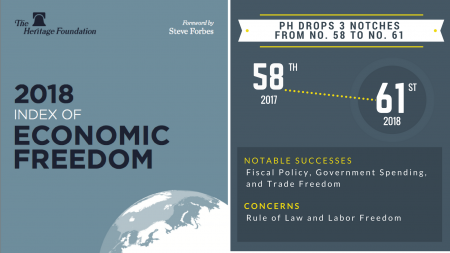- Home
- |
- About Us
- |
- Working Groups
- |
- News
- |
- Rankings
- WEF-Global Competitiveness Report
- Ease of Doing Business Report
- IMD-World Competitiveness Yearbook
- TI-Corruption Perceptions Index
- HF-Economic Freedom Index
- WEF-Global Information Technology Report
- WEF-Travel and Tourism Report
- WIPO-Global Innovation Index
- WB-Logistics Performance Index
- FFP-Fragile States Index
- WEF-Global Enabling Trade Report
- WEF-Global Gender Gap Report
- Gallery
- |
- Downloads
- |
- Contact Us
Philippines drops 3 notches in the 2018 Economic Freedom Index


The Philippines dropped 3 notches from No. 58 to No. 61 out of 180 economies ranked in the 2018 Index of Economic Freedom− this is the first time since 2011 the country recorded a drop in the ranking.
Published annually by US-based think-tank Heritage Foundation and The Wall Street Journal, the Index measures “a nation’s commitment to free enterprise” and scores economies in twelve categories, covering a broad range of factors including court system efficiency, tax rates, investment restrictions, and licensing requirements. Based on the average of these scores, economies are then classified as “free” (score of 80 or higher), “mostly free” (70-79.9), “moderately free” (60-69.9), “mostly unfree” (50-59.9), or “repressed” (below 50). Despite the drop in the ranking, the country maintained its status as a “moderately free” country for five years with a score of 65 (a drop of 0.6 points from 65.6). The Philippines also recorded improvements in the score of the following indicators: Judicial Effectiveness, (up 1.10, from 37.1 to 38.2), Fiscal Health (up 0.5, from 97.2 to 97.7), Labor Freedom (up 0.4, from 57.2 to 57.6) Trade Freedom (up 4.3, from 76.4 to 80.7); while there were no recorded change in Tax Burden which score remains at 78.9, Business freedom at 62.6, Investment Freedom and Financial Freedom both at 60. The country slipped in Property rights (down 4.20, from 49.2 to 45), Government Integrity (down 4.30, from 38.7 to 34.4), Government Spending (down 0.1, from 89.4 to 89.3), and Monetary Freedom (down 4.3, from 80.6 to 76.3). Among the ASEAN economies this year, the Philippines remains at 4th rank, just behind Singapore (Remained at No. 2), Malaysia (Up 5, from No. 27 to No. 22), and Thailand (Up 2, from No. 55 to No. 53); and ahead of Indonesia (the biggest gainer for the 2018 release with 15 notches improvement, from No. 84 to No. 69), Brunei (down 35 from No. 35 to No. 70), Cambodia (down 7, from No. 94 to No. 101), Myanmar (Up 11, from No. 146 to No. 135), Lao (down 5, from No. 133 to No. 138) and Vietnam (Up 6, from No. 147 to No. 141). Heritage Foundation also noted “the strong growth of the Philippine economy has allowed the government to prioritize domestic law-and-order issues over economic policy concerns” in which it calls for “deeper institutional reforms are required in interrelated areas: business freedom, investment freedom, and the rule of law.”
###

